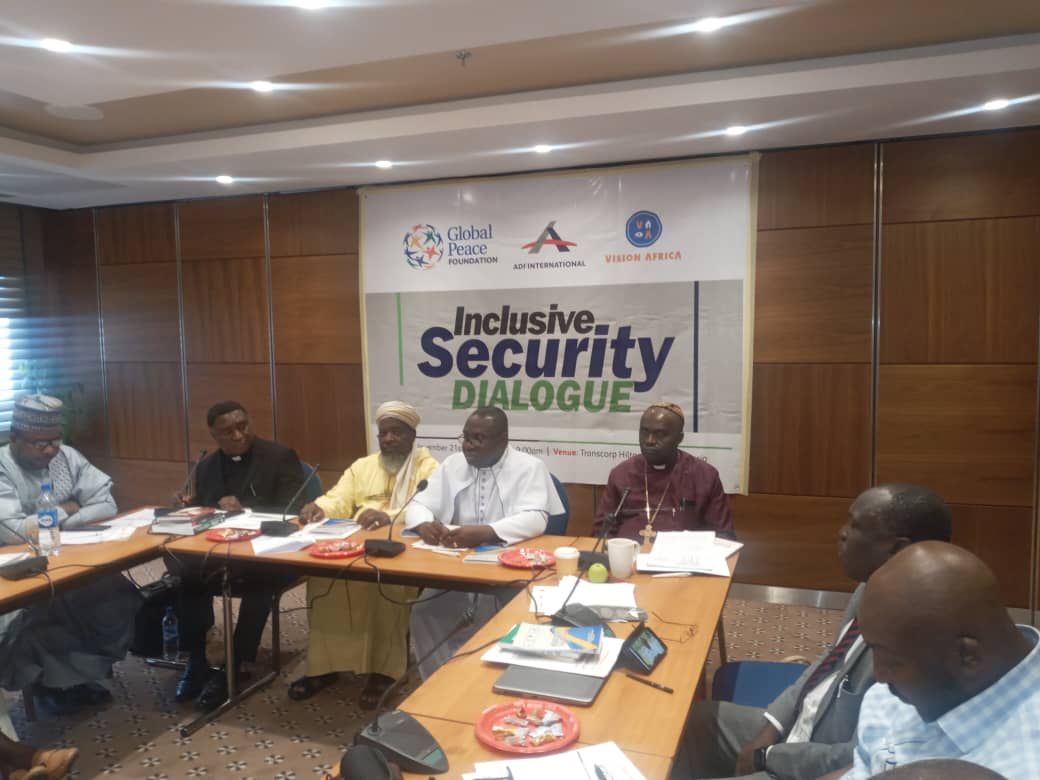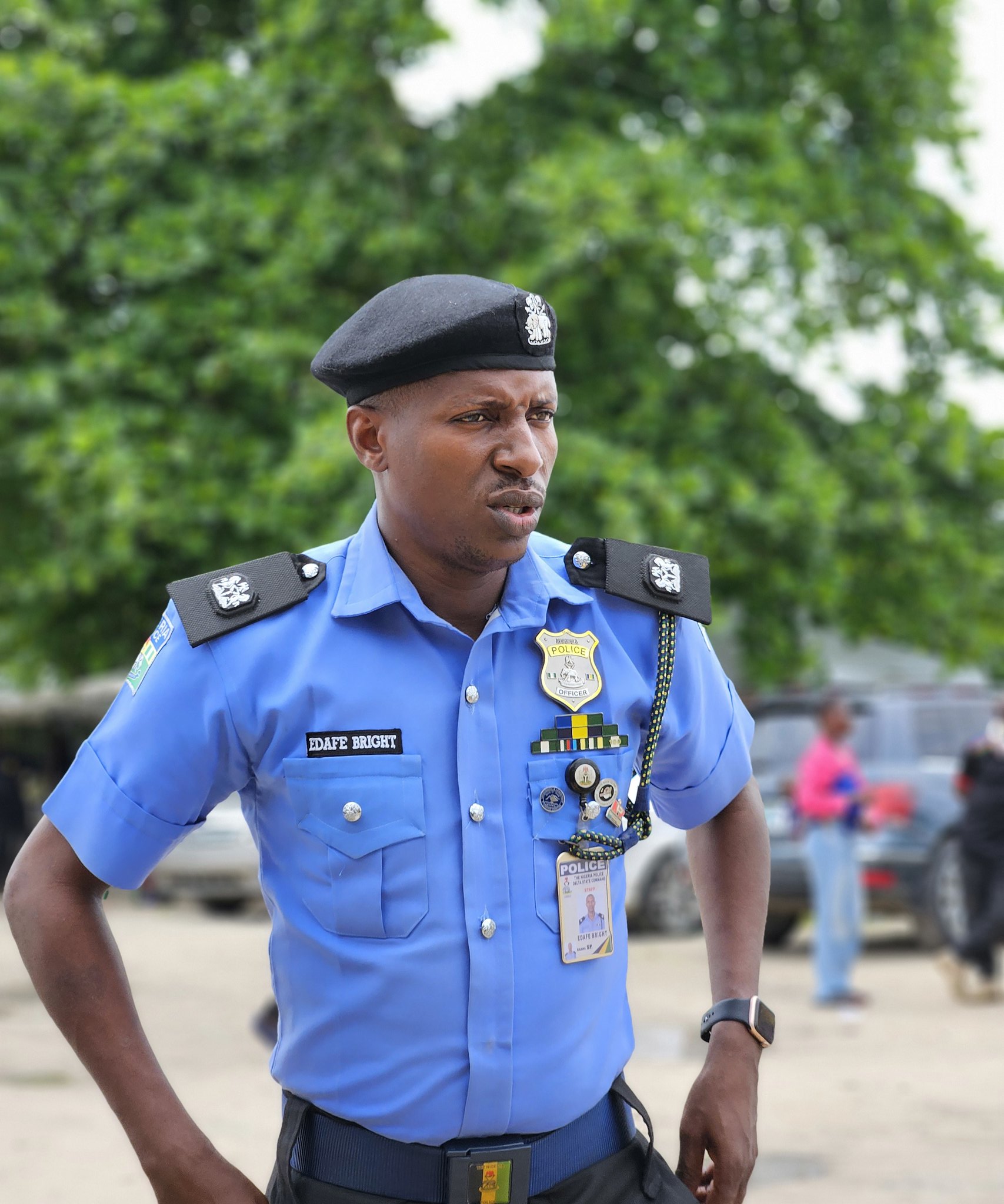
*CAN President seeks through reconciliation for total healing
Religious leaders have called on Nigerians to embrace peace and harmony as the country prepares for the next general elections. He made the call on Monday at a one-day Inclusive Security Dialogue organized by Global Peace Foundation in partnership with Vision Africa and ADF International.
Okoh stated that he was delighted to be part of the conversation and on behalf of the Chairman, of Nigeria Inter-Religious Council (NIREC), Sultan of Sokoto, Alhaji Sa’ad Abubakar 111, he described the dialogue as a welcome development, which the Council will love to be part of.
He however expressed the need for participants to be sincere as the dialogue continued. “What is important as we continue this conversation is to maintain sincerity, taking what we have done at the intellectual level down to the streets and the grassroots levels as it also requires the skills of those of us already converted to go out there and make sure that we work the talk because some of the platforms we think we can use are already invaded while some are polluted.
“We also need to find a way to do some financial investment, particularly in the media. If we don’t have control over the media, it will be difficult to disseminate proper information.
“This is a clarion call to those who have the future of this country at hand to make sure that we have a wider platform that we can use in reaching out to those at the grassroots level.
This is also an opportunity to address the clerics of both major religions as this is a very difficult time and a period of the test as people look up to us for direction. So, we must be able to give proper leadership by being honest in whatever we say as well as reducing hate speech in our public and private conversations
“Justice is at the basis of what we are saying. There is no reconciliation without justice. Someone spoke about the complicity and the silence of people in power. Injustice is perpetrated every day by bad governance, and people who should speak up are not speaking up in the face of injustice, then reconciliation is impossible”, Okoh stated.
African Regional Head, Global Peace Foundation, Rev. Fr. Canice C. Enyiaka, informed that the Dialogue was initiated last year to bring together religious leaders, community leaders, leaders of Civil Society Organizations and all well-meaning Nigerians to devise means of resolving challenges confronting the nation.
Speaking at the event that was held at the Transcorp Hilton Hotel, Abuja, Enyiaka, expressed worries that human dignity was under serious threat in Nigeria and expressed the need for urgent intervention.
He said: “We cannot overlook that. So, we must come together to see what can be done about it because if Nigeria is in order, everyone will enjoy it.”
He further identified four major areas of concern, including religious freedom which he said was the foundation of all other freedoms.
“We also look at human security. It is an integral part of what makes life beautiful. We also want to consider the challenges of national security and electoral violence. We see how our young people are killed during campaigns and elections. It is against human dignity to use people for sacrifices during elections. So, we all need to do something to make sure lives in Nigeria are not toyed with.”
For Enyiaka, the campaign should begin from the grassroots and as such, community and religious leaders as well as civil society leaders must return to their communities to help build on the principles of shared realities.
He added that considering the level of the dialogue which took place, the vision for a peaceful Nigeria is possible.
“It is very possible. In every human engagement, you need to be positive. Countries, communities and families have faced challenges in the past and those who decided to keep focused were able to transcend those challenges, and we strongly believe that with the level of conversations we had here, the commitment and sincerity that we saw here today, we have to be positive and keep working”, he stated.
Earlier in his opening remarks, the President, of Vision Africa, Bishop Dr Sunday N. Onuoha expressed the need for immediate action to save the country before it becomes too late.
He noted that the Inclusive Security Dialogue (ISD) was conceptualized and nurtured as a strategy to understand the conflict dynamics in Nigeria. To achieve this, he stated that the initiators had focused on increasing an understanding of the causes of conflicts and violence affecting the people; increasing a positive relationship between the Nigerian government and various agitating groups across the country and encouraging a refocus on the importance of universal principles and shared values as the glue for social cohesion and sustainable peace.
As Nigeria threads the path to yet another election in 2023, Onuoha held that the panacea to violence and the crises-free election is can be found among the committed and humane leaders and influencers of the polity, who are not bashful to acknowledge and understand the deep frustrations of other communities but are willing to put in the tent-pegs and lay out the milestones in the collective process toward security and peace in Nigeria.
He also talked about plans to meet with a cross-section of youth organizations in the country, considering the crucial place of young people as meaningful drivers of change at all levels of conflict prevention and peace-building.
Onuoha said: “Every responsive, inclusive and representative decision-making process excluding young people lacks sustainability. As the 2023 Nigerian elections approach, youth participation in conflict prevention and peace-building should be on the front burner because Extremist and dissident groups often look to raise fresh recruits among young people living in desperate conditions or within fractured societies.
“If we are to sell “Inclusiveness and Social Solidarity” to the people, it will produce fast and tangible results in cohesion and nation building.
“First, we must acknowledge that the time has come for the elite and the political class to hear the cry of the poor and the marginalized. If the political elite and the wealthy class continue to ignore the pain of the larger society, I am worried that very soon, the poor will be pushed to revolt.
“I am concerned that a time will come when the marginalized will push back, the unpaid workers whose backs are against the wall will break the divides and take back what they deserve, and when even the suckling infant will ask “why”, and no military might can withstand it.”
Adding: “How can we justify unguarded statements and utterly hateful speeches by leaders who are supposed to protect our collective interest? Why are some elites above the law even in the face of brazen crimes?
“A time will come when those persecuted because of their religious persuasion will demand accountability because it is the duty of the state to guarantee the fundamental rights that make us all human and humane.
“Can we truly say that in all parts of the country, people are free to practice their religion as guaranteed in the constitution? How can we as a country preach unity and oneness, yet we continue to maintain and enforce the ‘state of origin’ principle?
“In a society where people are angry and expressing their dissatisfaction, we must be humble enough to bring them to the dialogue table. No one should be too proud to dialogue, and no community should exclude herself from the dialogue table, because it is at the table that you can hear the cry of the aggrieved.
“It does not matter where you stand, we are first of all a common family under God, one humanity superseding any religion, ethnic bias, political affiliation and social status.”
Onuoha admonished that peace and security in Nigeria is more important than campaigning, noting that without peace, no one will come out to campaign or to vote.
He decried that with the rate of wanton killing in the country, an average Nigerian is asking if Nigeria is at war with itself.
“Why is it that people can no longer go to the farm without being kidnapped or raped on their own farms, and some even raped in their homes in the presence of members of their family.
“The cries of our innocent women have gone loud, and if the state cannot protect them, we should worry about them fighting back. Our highways that were initially death traps have also become kidnapping zones, and even the national capital appears to be under siege. If this is not an emergency situation, then what is? He asked.
Also speaking, Former Special Adviser to the Governor of Kaduna State on Islamic Matters, Alhaji Aliu Abdullahi, believed that the dialogue was impactful, especially as participants have been reminded that they are one in creation.
“Therefore, we have to do all we can to make sure that the relationship is strengthened and sustained. That can be done by making sure that we love our fellow human beings the same way we love ourselves.
“Our first constituency should be the human constituency regardless of any social difference. By doing that we would achieve a lot. Once a human relationship is achieved to this level, there won’t be civil unrest or unnecessary killings. The rate of killing in this country is very alarming.
“We have to unite regardless of any difference to make sure that we sustain the human relationship and also, to bring good governance to this country and the only way that can be achieved is by making sure that we unite as human beings.
“If there is no peace, there won’t be development and Nigeria requires development. We have to make sure that we live peacefully with one another”, he said.



![[FILES] A picture shows the Argentinian flag. (Photo by DANIEL LEAL-OLIVAS / AFP)](https://cdn.guardian.ng/wp-content/uploads/2020/11/Argentina-.jpg)


